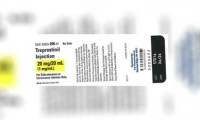-
Phesi’s AI-driven Trial Accelerator platform contains over 100 million patients
- Source: drugdu
- 422
- March 16, 2024
-
First UK patients receive experimental mRNA therapy for cancer in global trial
- Source: drugdu
- 318
- March 16, 2024
-
Royal Marsden to implement RaySearch’s online adaptive radiation therapy system
- Source: drugdu
- 491
- March 16, 2024
-
Swedish researchers develop new AI computer model to detect lymphatic cancer
- Source: drugdu
- 397
- March 16, 2024
-
Roche partners with Cardiff researchers to uncover new research into dementia
- Source: drugdu
- 299
- March 16, 2024
-
Par Pharmaceutical Issues Recall of Single Lot of Treprostinil
- Source: drugdu
- 343
- March 15, 2024
-
Novartis Pays $90M for Molecules That Could Take STING Out of Inflammation
- Source: drugdu
- 535
- March 15, 2024
-
AbbVie’s Produodopa approved by SMC to treat Parkinson’s disease patients in Scotland
- Source: drugdu
- 540
- March 15, 2024
-
US study reveals age-related skin changes could contribute to melanoma metastases
- Source: drugdu
- 286
- March 15, 2024
-
Hengrui Medicine’s new “PARP inhibitor” HRS-1167 combination therapy for advanced solid tumors received clinical approval
- Source: drugdu
- 796
- March 15, 2024
your submission has already been received.
OK
Subscribe
Please enter a valid Email address!
Submit
The most relevant industry news & insight will be sent to you every two weeks.

















